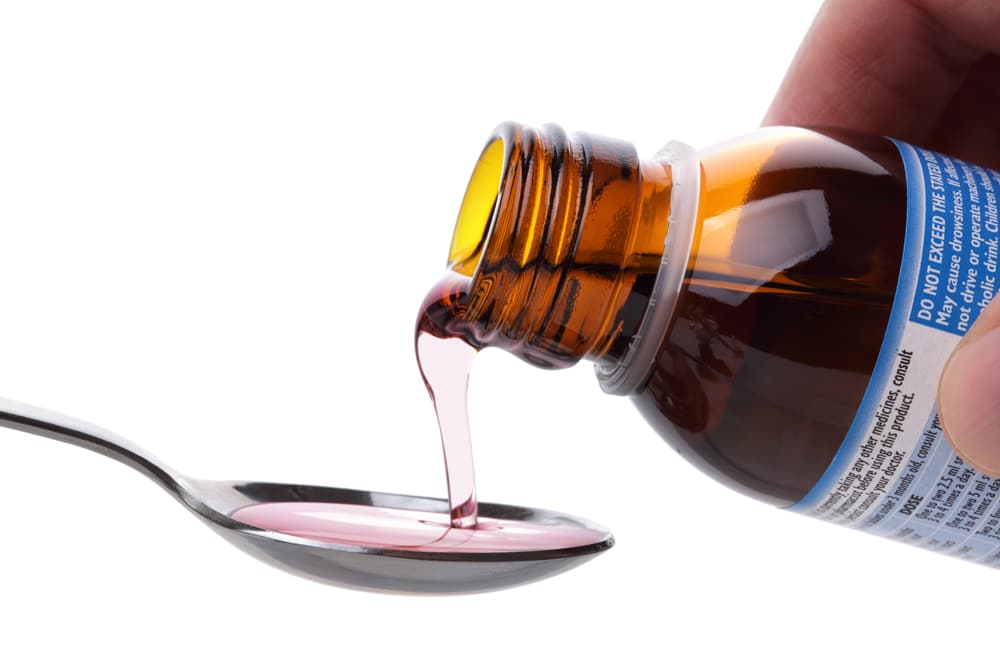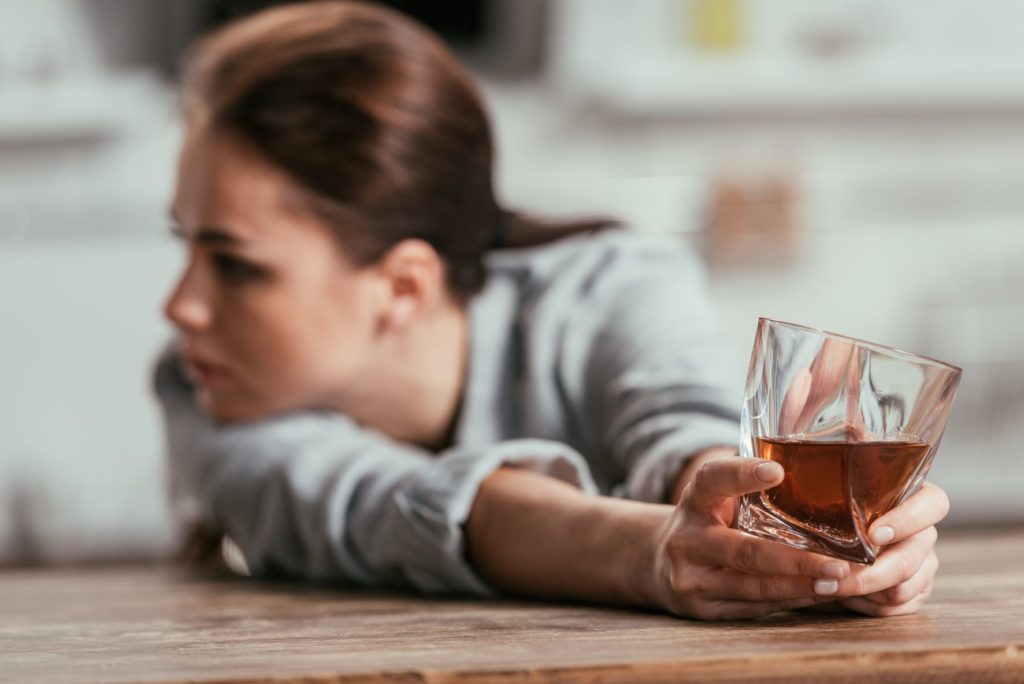People generally don’t give it a second thought about taking an over-the-counter medicine to treat a cold or the flu—and most of these drugs are safe when used as directed. However, drinking alcohol while taking popular over-the-counter drugs like DayQuil can be a recipe for disaster.
What is DayQuil?
DayQuil is a common over-the-counter medication that can help relieve the symptoms of a cold or the flu. It’s meant to treat sneezing, sore throat, headache, cough, and mild aches and pains that frequently accompany the flu or a cold. However, like any medication, DayQuil has ingredients that can interact with other substances, including alcohol.
Even though DayQuil comes in several formulas, many contain the drugs acetaminophen and dextromethorphan. Neither of these ingredients is safe to use with alcohol. And for individuals who suffer from alcohol addiction or alcohol use disorder (AUD), it’s safest to avoid medications that contain acetaminophen or dextromethorphan.

The Problem With Combining Alcohol and DayQuil
Taking DayQuil and drinking alcohol increases the risk of developing:
- Liver damage
- Dizziness
- Drowsiness
- Nausea and vomiting
Ingesting high doses of both can cause:
- Hallucinations
- High blood pressure
Acetaminophen and Liver Damage
Acetaminophen is also sold under the brand name Tylenol. It’s the most common drug ingredient in the U.S. and is found in more than 600 medications. This includes many popular over-the-counter medications. And even though it is an effective pain reliever and fever reducer, it can also be toxic to your liver.
In fact, the leading cause of acute liver failure in the U. S. is acetaminophen overdose. And it’s the second-leading cause of liver failure that requires transplantation. Taking acetaminophen, or medications that contain it, and drinking alcohol increase your risk of liver damage. DayQuil manufacturer Procter & Gamble cautions that the safest choice is to not drink at all while taking DayQuil, especially if you usually drink heavily and regularly.
Using alcohol and acetaminophen together can cause serious side effects such as:
- Fever
- Joint pain or swelling
- Chills
- Excessive tiredness or weakness
- Unusual bleeding or bruising
- Loss of appetite
- Nausea and vomiting
- Yellowing of the skin and whites of the eyes
How Liver Damage Occurs
The risk of taking too much acetaminophen or mixing it with alcohol comes from how your body breaks down acetaminophen. When processed by the liver, acetaminophen is broken down into a number of substances. Most of these are removed in our urine. One of those substances is known as NAPQI and it is especially hard on the liver.
Symptoms of Liver Damage
- Jaundice (yellowing of the skin or whites of the eyes)
- Abdominal pain in the upper right side
- Abdominal swelling
- Loss of appetite
- Nausea or vomiting
- Tiredness
- Sweating
Fortunately for us, when acetaminophen is taken in safe doses, the body has a way to deal with the harmful effects of NAPQI. That is, a powerful antioxidant called glutathione that the liver uses to neutralize the NAPQI and prevent it from damaging liver cells.
However, individuals who drink heavily (3 or more drinks per day) cause glutathione levels to drop, which allows NAPQI to build up to dangerous levels that can damage liver cells. Due to this, chronic drinkers are more at risk for an unintentional acetaminophen overdose. This can result in severe liver damage or even liver failure.
Symptoms of Acetaminophen Overdose
- Abdominal pain
- Loss of appetite
- Fatigue
- Nausea
- Diarrhea
- Sweating
- Vomiting
- Convulsions
- Yellowing of the skin or eyes
- Coma
The DXM Effect
Dextromethorphan, or DXM, is an ingredient in DayQuil that helps suppress coughing and is also unsafe when combined with alcohol. Dextromethorphan’s side effects can include:
- Dizziness
- Lightheadedness
- Drowsiness
- Problems concentrating
- Nausea
- Vomiting.
Plus, alcohol can make these side effects even worse. Some people also experience impairment in thinking and judgment. This is why it is recommended that you don’t engage in activities that require mental alertness such as driving or operating hazardous machinery.
Regrettably, abuse of products that contain DXM is a common problem among teens in the U.S. who use excessive amounts of the drug for its psychoactive effects. Some terms for this practice include “robotripping” and “skittling.” Using more than the recommended dose of DXM can cause:
- Euphoria
- Visual and auditory hallucinations
- Skittishness
- Lethargy
- Slurred speech
- Sweating
- High blood pressure
- Loss of coordination
Adding alcohol to products containing DXM can also increase your risk for liver damage. If high doses are consumed with alcohol, an individual may experience shallow breathing, stupor, or coma which can even lead to death.
Symptoms of DXM Overdose
- Constipation
- Hallucinations
- Unsteady walking
- Pounding heartbeat, rapid heartbeat
- Breathing problems (slow and labored breathing, shallow breathing)
- Stomach and intestinal spasms
- Higher body temperature
- Drowsiness
- Seizures
- Coma
Abuse of DXM by teens is such a problem that some states, such as Florida, have banned children under the age of 18 from buying over-the-counter medications that contain dextromethorphan.
NyQuil, a cold and flu medication similar to DayQuil that is meant for nighttime use, has the same risks and more due to its additional ingredients. When you consider the risks to your health, it’s best to not drink alcohol while taking DayQuil. Conversely, if you have an alcohol use disorder and are unable to stop drinking, then it’s safer to skip the DayQuil and just power through your cold or flu.
Can You Drink With DayQuil?
DayQuil’s effects last approximately 4 to 6 hours depending on how you’re feeling. It’s not recommended to mix the two but you can have a drink after 4 to 6 hours from when you took your last dose. On the other hand, a single drink of alcohol can last in your body for about 3 hours. Therefore, it’s best not to take more DayQuil after having a drink. The time period varies from person to person.

Alcohol and DayQuil: Sign of a Bigger Problem?
It could be. Abusing DayQuil to get high, called “robotripping”, can be intensified by adding alcohol to the experience. Some people use dextromethorphan throughout the day to maintain a consistent high. People who do this can develop a tolerance, including a physical and psychological dependence on DXM.
Although DXM is considered non-addictive, it is far from safe if used excessively. If you or someone you care about is having a problem quitting dextromethorphan, professional help may be necessary. Withdrawal symptoms from DXM are not life-threatening but can be very uncomfortable and include:
- Insomnia
- Restlessness
- Muscle or bone aches
- Diarrhea and vomiting
- Cold flashes
Alcohol
On the other hand, alcohol can be very addictive. If you are also battling an AUD, a medically supervised detox may be necessary. Withdrawal from alcohol can be extremely difficult and may be life-threatening. Withdrawal symptoms include:
- Fever
- Anxiety
- Headache
- Shaking hands
- Nausea and vomiting
- Extreme sweating
- Hallucinations and delusions
- Delirium Tremens (DTs)
- Seizures
Is it Safe to Use Any Medications With Alcohol?
There are literally hundreds of prescription and over-the-counter medications that aren’t safe to use at the same time as alcohol. The risks of mixing alcohol with medications can range from increased side effects to possibly life-threatening symptoms, overdose, and death.
Cough Suppressants
The same as cold flu remedies, combining alcohol with medications used to treat a cough can cause:
- Drowsiness
- Dizziness
- Loss of motor skills
One of the ingredients of most cough medicine is DXM, which can cause extreme sedation and respiratory depression as mentioned earlier. The effects of this mixture can be particularly serious and potentially deadly when the medicine also contains alcohol.
Diabetes Medications
If you have diabetes, drinking alcohol can have an effect on your blood sugar levels. Drinking alcohol with diabetes medications can have the same effect. It can also cause symptoms like:
- Nausea
- Vomiting
- Headache
- Rapid heartbeat
- Sudden blood pressure changes
Heartburn Medications
Using alcohol while taking medications for treating heartburn, prescription, and over-the-counter can cause tachycardia (rapid heartbeat), and sudden blood pressure swings.
Hypertension (High Blood Pressure) Medications
Combining hypertension medications and alcohol can cause:
- Fainting
- Dizziness
- Drowsiness
- Arrhythmia (irregular heartbeat).
Muscle Relaxants
If you’re dealing with an injury or medical condition that causes pain or muscle spasms, you may be taking medication to relax them. Mixed together, muscle relaxants and alcohol both suppress your central nervous system which controls the function of your heart, lungs, and brain.
Opioid Pain Medications
Using alcohol and opioid pain medications together is one of the deadliest combinations. Used alone, opioids can cause:
- Dizziness
- Drowsiness
- Slowed or impaired breathing
- Loss of motor control
- Abnormal behavior
- Loss of memory
Mixing this type of medication with alcohol intensifies the side effects and raises the risk of a fatal overdose.
Treatment
There aren’t any approved medications to treat DXM addiction. However, if the person also has a co-occurring condition of alcohol use disorder, a more complex treatment plan will be necessary and there are medications that may be used for treating alcohol withdrawal.

When treating a substance use disorder (SUD), behavioral therapies have been shown to be the most effective. Some commonly used behavior therapies are:
- Cognitive-Behavioral Therapy: CBT helps the individual understand how their flawed beliefs lead to their behavior and help them manage triggers and stress.
- Dialectical Behavior Therapy: DBT helps the person learn to accept what has happened and focus on changing. DBT focuses more on relationships and emotions.
Programs
When treating SUD, there are typically several programs available, and depending on the severity of the disorder, a person may need:
- Residential Treatment
- Partial Hospitalization Program (also known as Partial Day Program)
- Intensive and Regular Outpatient Programs
Having several levels of care available ensures that the individual enters at the right level and has levels to transition to after completing a higher level.
Higher Risk for Women
In general, women have a higher risk for problems than men. When a woman drinks, the alcohol in her bloodstream will usually reach a higher level than a man’s, even if they are both drinking the same amount. That’s because women generally have less water in their bodies than men. Since alcohol mixes with body water, a certain amount of alcohol is more concentrated in a woman’s body. As a result, women are more likely to suffer alcohol-related damage to organs such as the liver.
Women-Only Treatment in California
We know that women are different than men. And at New Directions for Women, we know that the treatment needs of women are also different. That’s why we offer a women-only treatment facility geared to meet the needs and requirements of women.
New Directions for Women has several levels of care, along with a medically supervised detox, sober living, aftercare, and alumnae programs. With our experienced and professionally licensed staff, you may participate in behavioral therapies along with group, individual, and family therapy. We are specialists in helping women reach their goals. Contact us today.
Frequently Asked Questions About Mixing DayQuil and Alcohol
Can mixing DayQuil and alcohol worsen cold or flu symptoms?
While alcohol itself doesn’t worsen cold or flu symptoms, it can exacerbate side effects associated with DayQuil, such as drowsiness and dizziness, making it more challenging to manage symptoms effectively.
Are there any specific ingredients in DayQuil that interact with alcohol?
The combination of alcohol with the active ingredients in DayQuil (such as dextromethorphan, acetaminophen, and antihistamines) can lead to increased drowsiness and other adverse effects.
What should I do if I accidentally drank alcohol while taking DayQuil?
If you’ve inadvertently consumed alcohol while on DayQuil, it’s essential to monitor yourself for any adverse reactions. Avoid operating heavy machinery or engaging in activities requiring mental alertness until the effects wear off. Additionally, it’s advisable to drink plenty of water to stay hydrated and consider seeking medical advice if you experience severe symptoms from mixing DayQuil and alcohol.
Can mixing alcohol with DayQuil lead to overdose?
While it’s unlikely to overdose solely from mixing DayQuil and alcohol, excessive consumption of both substances can exacerbate other side effects and increase the risk of liver damage due to acetaminophen overdose. It’s crucial to use both substances responsibly and as directed.
Is it safe to drink alcohol the day after taking DayQuil?
It’s generally safe to drink alcohol the day after taking DayQuil, provided that the effects of the medication have worn off completely. However, it’s essential to remain mindful of potential interactions and to drink alcohol responsibly.
Should I consult a healthcare professional before mixing alcohol with DayQuil?
Still wondering, can you drink on Dayquil? It’s always advisable to consult with a healthcare professional, particularly if you have any underlying health conditions or are taking other medications. They can provide personalized advice based on your specific circumstances and help minimize any potential risks associated with mixing alcohol and DayQuil.












